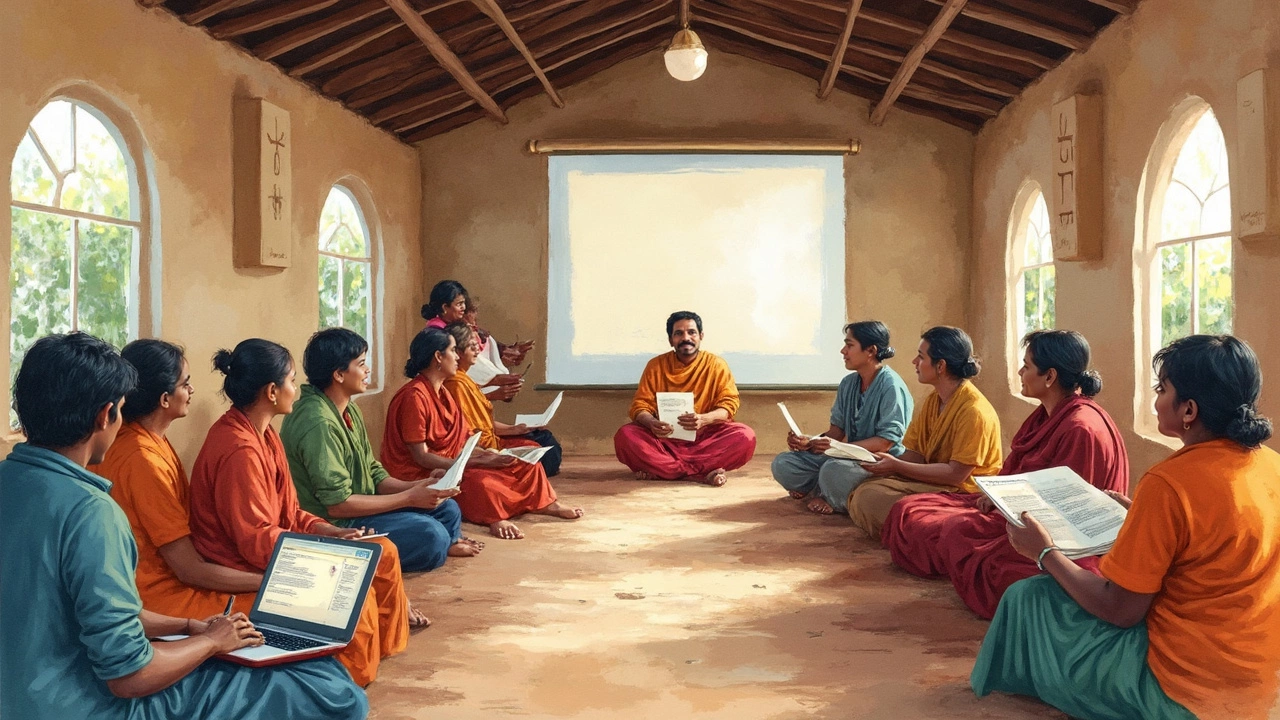Roles in an Outreach Program: A Closer Look
 Feb, 16 2025
Feb, 16 2025
Ever wondered why some outreach programs succeed while others struggle? It often boils down to having the right people in the right roles. Each role in an outreach program has its own unique set of responsibilities and knowing these can make all the difference.
The coordinator is like the program's backbone—nothing happens without their say-so. They're the ones juggling schedules, budgets, and resources to keep everything ticking over smoothly. Sounds like a lot, right? It is, but it's essential for turning ideas into action.
Then come the volunteers. If you think of an outreach program as a living, breathing entity, volunteers are its heart and soul. They're the foot soldiers, spreading the message and doing the groundwork. Their energy and commitment often determine the program's reach and impact.
- The Coordinator: The Backbone
- Volunteers: The Heart and Soul
- Specialists: The Experts
- Advocates: The Voice
- Tips for Effective Role Fulfillment
The Coordinator: The Backbone
In the world of outreach programs, coordinators are the unsung heroes. They're the glue holding everything together, making sure every piece plays its part. Without them, programs can quickly fall into chaos. What exactly do these folks do? Let's break it down.
Planning and Organizing
Coordinators are the masterminds behind project plans. They lay out timelines, set goals, and ensure everyone knows their tasks. Much like a director in a movie, they're behind the scenes, pulling the strings.
- Set clear objectives: They define what the program is aiming to achieve.
- Scheduling: They organize events and activities, making sure no detail slips through the cracks.
- Resource allocation: They manage budgets, equipment, and any other resources the program needs.
Communication Central
Good communication is at the heart of a successful outreach effort. Coordinators are the go-to point for all things communication. They bridge gaps between various groups involved, from volunteers to specialists.
- Meetings: Regular check-ins with teams and participants to keep everyone on the same page.
- Updates: Maintaining transparent communication channels so everyone knows where the project stands.
Problem Solving and Adaptability
Even the best-laid plans run into hiccups. Coordinators play a crucial role in identifying issues and adapting strategies as needed. Their problem-solving skills ensure the program stays on track, come what may.
Evaluating Success
Finally, coordinators evaluate the program's success. They assess whether the goals were met and how future efforts might improve upon what's been done. It's not just about celebrating wins but learning from challenges too.
Coordinating isn't just a job—it's a balancing act requiring a mix of organization, communication, and flexibility. Next time you join an outreach program, remember that coordinators are the backbone, working tirelessly to ensure everything runs smoothly.
Volunteers: The Heart and Soul
Without volunteers, many community outreach programs wouldn't see the light of day. They bring the energy, dedication, and hands-on involvement that turn plans into reality. So, what makes volunteers the cornerstone of any successful outreach program?
Commitment and Passion
Volunteers often come packed with dedication and a genuine desire to make a difference. It's this passion that drives them to go the extra mile, whether that means knocking on hundreds of doors or being there at the crack of dawn to set up for an event. This zeal is infectious and can rally more people to join the cause.
Diverse Skills
Volunteers are a mixed bag of talents and skills. You'll find everyone from retired accountants helping with financial planning to teachers assisting with educational initiatives. This diversity not only enriches the program but also enables it to address various aspects effectively. If you've ever needed a jack-of-all-trades, you've likely found one among the volunteers.
The Power of Numbers
Here's a fun fact: one volunteer hour has an estimated monetary value of about $30 in Australia. When you add up the hours contributed by a team of volunteers, you're talking a serious economic impact. Imagine what happens when these committed individuals take on multiple projects or roles within the same program.
Building Community Ties
Volunteers get into the thick of things—they build relationships, engage with community members, and often become the face of the project. This grassroots involvement strengthens community ties and boosts trust and credibility in the program itself.
Challenges and Rewards
Volunteering isn't without its challenges. Juggling responsibilities, preventing burnout, and ensuring everyone feels valued are ongoing efforts. But the rewards? They're immeasurable. Volunteers gain a sense of fulfillment, new friendships, and skills that they can carry into future endeavors.
Conclusion
In a nutshell, volunteers breathe life into community engagement. They are the heart and soul, not because they have to be, but because they choose to be. As they say, the best way to find yourself is to lose yourself in the service of others, and volunteers are living proof of that.

Specialists: The Experts
When it comes to outreach programs, having specialists on board can be a game-changer. These experts bring specific skills and knowledge that can address unique community needs. Whether it's offering legal advice, healthcare services, or educational workshops, their expertise ensures the program not only runs efficiently but also delivers meaningful impact.
Consider a community health outreach program. Here, medical specialists like doctors and nurses set up free clinics to provide check-ups and vaccinations. This isn't just about offering care; it's about empowering the community with knowledge on preventive measures. A registered nurse working in a Brisbane outreach program once said,
"Our goal isn't just to treat but to educate. The more people know about their health, the more in control they feel of their own lives."
But it's not just about health. Specialists in education play a big role too. They conduct workshops that promote literacy and offer tutoring for kids. They ensure learning is accessible to everyone, especially in under-resourced areas.
Tapping Into Technological Expertise
In today's digital age, having a tech-savvy specialist is crucial. Community projects can benefit hugely from modern tools and platforms. Tech specialists can help develop websites for community awareness or manage digital campaigns to reach a wider audience.
A practical example can be seen in a Brisbane-based initiative that leveraged a digital platform for environmental education. This allowed them to significantly increase their participant numbers.
| Program | Specialist Contribution |
|---|---|
| Health Clinics | Medical Consultation |
| Education Workshops | Literacy & Tutoring |
| Environmental Awareness | Digital Campaigns |
Incorporating the right specialists not only adds value but also boosts the credibility of an outreach program. So, if you're thinking about starting or enhancing a program, consider what kind of expertise could best serve your causes.
Advocates: The Voice
Advocates are the ones who make sure your outreach program's message gets out there—they're the voice of the initiative. These folks are masters of communication, using their skills to raise awareness about the cause and rally support from the community.
One key role they play is engaging with potential supporters through social media, local events, and sometimes even press releases. They're always looking for ways to connect with the public and share the program's mission. Think of them as the bridge between the community and your outreach program.
The Art of Persuasion
Advocates know how to present information in a way that resonates with people. They craft messages that highlight the benefits of the program and demonstrate the positive impact it has. This might involve storytelling, showcasing past successes, or simply hammering home the importance of the cause.
Building Relationships
Building relationships is a big part of their job. They're constantly networking, finding local influencers or community leaders who can further the reach of the program. After all, a well-connected advocate can make a world of difference.
- Community Engagement: Advocates often act as ambassadors at community events, bringing new faces into the program.
- Feedback Gathering: They collect opinions and concerns from the community, providing valuable input for the program's development.
By strategically using local media, online platforms, and good old-fashioned face-to-face interaction, advocates ensure that the voice of your outreach program is strong and influential. They're a crucial part of keeping the momentum going and ensuring the program's goals are brought to life.

Tips for Effective Role Fulfillment
Getting involved in an outreach program can be incredibly rewarding, but to make the most of your role, a few strategies can help you stand out and truly contribute. Whether you’re a coordinator, volunteer, specialist, or advocate, these tips are bound to elevate your impact.
For Coordinators
- Plan Like a Pro: Use project management tools to keep track of tasks and timelines. It can be something as simple as a Google Sheet or a more advanced program like Trello.
- Communicate Clearly: Regular updates to your team are crucial. Use Slack or email to keep everyone in the loop.
- Don’t Forget the Feedback: Always gather feedback post-event. It helps refine your process and shows that volunteers' opinions are valued.
For Volunteers
- Be Reliable: Show up on time and be consistent with your commitments. Reliability builds trust within the team.
- Stay Informed: Know the details of the community roles you’re involved in and ask questions if in doubt.
- Bring Enthusiasm: A positive attitude is infectious and can motivate the entire group.
For Specialists
- Share Your Knowledge: Host mini-training sessions or workshops to empower others with your expertise.
- Be Approachable: Make sure others feel comfortable approaching you with questions or for guidance.
For Advocates
- Know Your Audience: Tailor your message for different groups to maximize engagement. Use social media platforms strategically by understanding their unique demographics.
- Stay Informed: Keep up-to-date with the latest trends and information related to your cause to ensure accurate advocacy.
Overall, the key to effective community engagement lies in understanding your role and playing to your strengths. With the right approach, not only will you be contributing greatly to the cause, but you'll also gain invaluable experience and skills.